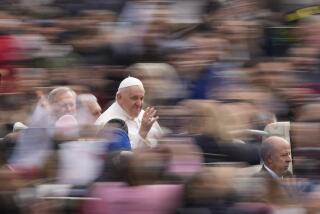Jerusalem readies for Pope Francis’ Holy Land tour
- Share via
Reporting from Jerusalem — Days ahead of Pope Francis’ arrival in Jerusalem as part of his pilgrimage to the Holy Land, Israeli authorities put the finishing touches on preparations for the visit, smoothing out protocol on pomp, protection and politics.
Half a century after the first papal visit to the country, Pope Francis will be the fourth to visit Israel and third since 2000, after John Paul II and Benedict XVI.
Announced in January, Pope Francis’ pilgrimage commemorates the historic 1964 visit of Paul VI, and his momentous meeting with Orthodox Patriarch Athenagoras.
Politically, that visit was awkward for both Israel and the Vatican, which did not establish diplomatic relations until 1993 when the Holy See recognized Israel.
However, it was deeply significant to the church and a landmark in relations between the Roman Catholic and eastern Orthodox churches. In paying homage to that event, Francis will meet with the current patriarch, Bartholomew I.
From Amman, Jordan, to Bethlehem in the West Bank to Jerusalem, the Holy Land visit is designed as a spiritual pilgrimage. But it is also a media and diplomatic event of elaborate and meticulous protocol, which both Israelis and Palestinians hope will benefit their agendas.
The itinerary reflects what appears to be a careful balance crafted to make a maximum statement with minimal bias. Francis will meet with Palestinian President Mahmoud Abbas in Bethlehem, with Israeli President Shimon Peres in the president’s residence in Jerusalem and with Israeli Prime Minister Benjamin Netanyahu at the Vatican’s Notre Dame Center in Jerusalem.
In an interfaith gesture, Pope Francis is traveling with Rabbi Abraham Skorka and Sheikh Omar Abboud, Jewish and Muslim leaders from his native Argentina, and will meet with the grand mufti of Jerusalem and Israel’s chief rabbis.
In addition to religious events, the 23 stops listed for Pope Francis’ 36-hour visit to Bethlehem and Jerusalem include meetings with Palestinian refugees and Holocaust survivors, among others.
A number of venues are potentially sensitive, such as the planned visit to Jerusalem’s Mt. Herzl, the burial site of Zionist leader Theodore Herzl. Like the nearby Yad Vashem holocaust memorial, it is a routine stop for visiting dignitaries, causing controversy when skipped.
Some observers see Francis’ planned visit as especially significant, since Herzl’s request for Vatican support was rebuffed by Pope Pius VI in 1904 and no previous pope has stopped at his grave.
In a news conference in Jerusalem before the visit, Rabbi Skorka called it a “meaningful act,” reflecting the pope’s understanding of Israel’s significance to the Jews. However, he stressed that Pope Francis was striving for balance during the visit.
Another touchy site is the Cenacle, the reputed site of the Last Supper that shares the same structure with a site Jews revere as the tomb of King David, although some traditions place his burial elsewhere in Jerusalem.
The site has been the subject of talks between Israel and the Vatican. Rumors that Israel intends to hand it over to the Holy See have been denied by officials but have roused Jewish right-wing circles, adding to existing security concerns.
Around 10,000 police will be deployed during the pope’s visit. Francis has refused offers of bulletproof transport during his time in the region.
To reduce chances of provocations such as vandalism of Christian and other sites, authorities have issued orders barring several Jewish extremists from Jerusalem during the visit.
While Israeli and Palestinian officials keenly scrutinize each other’s role in the visit, the pope has insisted it will be a religious and spiritual pilgrimage, not a political visit.
“Pope Francis doesn’t take sides in the various conflicts; he maintains balance and symmetry,” said Raymond Cohen, a Hebrew University professor of international relations.
At the same time, Cohen said, “he must pay various political dues.”
An expert in Israel-Vatican ties, Cohen said he welcomed the visit as a sign of “ongoing improvement of relations” between the two, but does not think it will be politically significant for Israel.
As for chances the Pope will offer himself as a mediator to advance Israeli-Palestinian peace, “it didn’t work very well for John Kerry,” Cohen said, referring to the U.S. secretary of State’s tireless — but so far fruitless — efforts to bring peace to the region.
Sobelman is a special correspondent.
More to Read
Sign up for Essential California
The most important California stories and recommendations in your inbox every morning.
You may occasionally receive promotional content from the Los Angeles Times.










